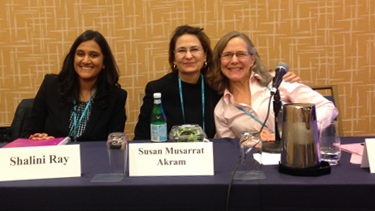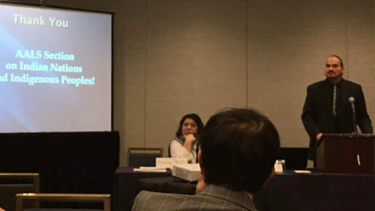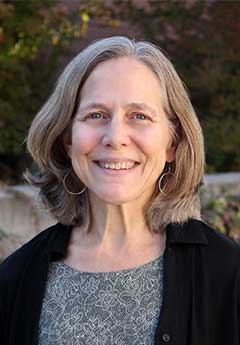Three UNM Law School faculty present at national law school conference
January 9, 2017 - Tamara Williams

Three UNM Law School faculty contributed to making the case for "Why Law Matters," the theme of the 111th Annual Meeting of the Association of American Law Schools (AALS), held in San Francisco from January 3 – 7, 2017.
"Law is often seen too narrowly as being only a system of dispute resolution rather than in its broader role of creating the ecosystem for human flourishing," according to the conference program. The theme of the conference was to make the case for why law matters and the role of law schools in advancing respect for and understanding of the rule of law.
Professor John P. LaVelle

On Thursday, January 05, 2017, Professor John P. LaVelle participated in a panel on "The Supreme Court's Recent Indian Law Jurisprudence" in the Section on Indian Nations and Indigenous Peoples.
The speakers presented and discussed scholarship related to the United States Supreme Court's recent Indian law jurisprudence. The discussion sought to identify trends and illuminate strategies of Supreme Court litigation involving questions of federal Indian law.
LaVelle spoke about strategies for continuing to litigate an Indian country-based wrongful death and personal injury case in which he serves as co-counsel, in the wake of the Supreme Court's June 2016 denial of a petition, co-authored by LaVelle, for a writ of certiorari regarding an earlier phase of the same dispute. His presentation was titled "Indian Law Preemption + Choice of Tribal Law: A Post-Dollar General Alternative to Tribal Court Jurisdiction?"
Professor Jenny Moore

Also on Thursday, January 05, 2017, Professor Jennifer Moore moderated the panel, "Asylum from Persecution by Non-State Actors: Upholding and Updating Refugee Protection" in the section on Immigration Law.
From the conference program: The rise of the non-state persecutor is one of the most significant developments in refugee and asylum law in recent years. We see the impact of the non-state persecutor all around the world, with the rise of ISIS and other non-state militant movements in the Middle East, the proliferation of criminal gang and drug cartel attacks in Central America and Mexico, and the brutal spread of domestic violence everywhere. How has refugee and asylum law responded? How should the law respond? For example, is the traditional distinction between asylum seekers and internally displaced persons still relevant when our concepts of statehood are changing? When the persecutor is an abusive spouse or a neighborhood gang, are you a refugee or merely a migrant? And is the rise of asylum fatigue connected to the shifting identity of persecutors? This panel explores the impact of the non-state persecutor on refugee protection.
Professor Emerita Margaret Montoya

On Friday, January 06, 2017, Professor Margaret Montoya participated on the panel, "Transitions: Preparing For Life Beyond the Legal Academy."
From the conference program: Much attention is given to preparing new teacher-scholars virtually no attention to or discussion about how to leave the legal academy after a substantial career as a law professor. This discussion focuses on how and when to retire as a law professor - how to leave and where to go. The program addresses emotional and psychological challenges likely to occur as you prepare for this important transition. How do you perceive the "new you"? The law school community must change as a long-time valued member of the faculty leaves. In varying ways, your retirement affects the remaining faculty members, students, alums, members of the legal profession as well as the broader community.
We expect at the end of this session that attendees will have: a better sense of the important questions to ask while preparing for life beyond the legal academy; further insight into their own aspirations and apprehensions regarding the post legal academy adventure; a preliminary strategy for prioritizing and identifying post legal academy activities; a sense of expectation and encouragement regarding the law school professor "afterlife" rather than dread and fear; a handout designed to help them to continue planning for their future.
Montoya says that deciding to retire was both a process and an event. "Now, as a working retiree, I work less and control my hours and place of work...And then comes the Trump election, and retirement has a new urgency and once again I am pulled into my law professor-ness...I can roll up my sleeves and reenter the fray, organizing, resisting, dissenting."
